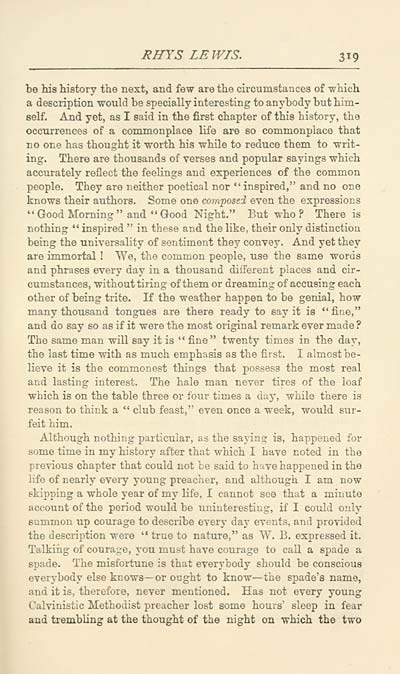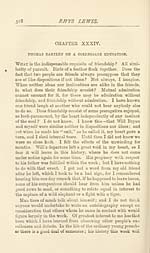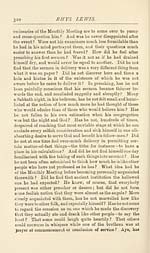Download files
Complete book:
Individual page:
Thumbnail gallery: Grid view | List view

RHYS LEWIS. 319
be his history the next, and few are the circumstances of which
a description would be specially interesting to anybody but him-
self. And yet, as I said in the first chapter of this history, the
occurrences of a commonplace life are so commonplace that
no one has thought it worth his while to reduce them to writ-
ing. There are thousands of verses and popular sayings which
accurately reflect the feelings and experiences of the common
people. They are neither poetical nor "inspired," and no one
knows their authors. Some one composed even the expressions
" Good Morning " and " Good Night." But who? There is
nothing " inspired " in these and the like, their only distinction
being the universality of sentiment they convey. And yet they
are immortal ! "We, the common people, use the same words
and phrases every day in a thousand different places and cir-
cumstances, without tiring of them or dreaming of accusing each
other of being trite. If the weather happen to be genial, how
many thousand tongues are there ready to say it is "fine,"
and do say so as if it were the most original remark ever made ?
The same man will say it is " fine" twenty times in the day,
the last time with as much emphasis as the first. I almost be-
lieve it is the commonest things that possess the most real
and lasting interest. The hale man never tires of the loaf
which is on the table three or four times a daj-, while there is
reason to think a " club feast," even once a week, would sur-
feit him.
Although nothing particular, as the saying is, happened for
some time in my history after that which I have noted in the
previous chapter that could not be said to have happened in the
life of nearly every young preacher, and although I am now
skipping a whole year of my life, I cannot see that a minute
account of the period would be uninteresting, if I could only
summon up courage to describe every day events, and provided
the description were " true to nature," as W. B. expressed it.
Talkiiig of courage, you must have courage to call a spade a
spade. The misfortune is that everybody should be conscious
everybody else knows— or ought to know— the spade's name,
and it is, therefore, never mentioned. Has not every young
Calvinistic Methodist preacher lost some hours' sleep in fear
and trembling at the thought of the night on which the two
be his history the next, and few are the circumstances of which
a description would be specially interesting to anybody but him-
self. And yet, as I said in the first chapter of this history, the
occurrences of a commonplace life are so commonplace that
no one has thought it worth his while to reduce them to writ-
ing. There are thousands of verses and popular sayings which
accurately reflect the feelings and experiences of the common
people. They are neither poetical nor "inspired," and no one
knows their authors. Some one composed even the expressions
" Good Morning " and " Good Night." But who? There is
nothing " inspired " in these and the like, their only distinction
being the universality of sentiment they convey. And yet they
are immortal ! "We, the common people, use the same words
and phrases every day in a thousand different places and cir-
cumstances, without tiring of them or dreaming of accusing each
other of being trite. If the weather happen to be genial, how
many thousand tongues are there ready to say it is "fine,"
and do say so as if it were the most original remark ever made ?
The same man will say it is " fine" twenty times in the day,
the last time with as much emphasis as the first. I almost be-
lieve it is the commonest things that possess the most real
and lasting interest. The hale man never tires of the loaf
which is on the table three or four times a daj-, while there is
reason to think a " club feast," even once a week, would sur-
feit him.
Although nothing particular, as the saying is, happened for
some time in my history after that which I have noted in the
previous chapter that could not be said to have happened in the
life of nearly every young preacher, and although I am now
skipping a whole year of my life, I cannot see that a minute
account of the period would be uninteresting, if I could only
summon up courage to describe every day events, and provided
the description were " true to nature," as W. B. expressed it.
Talkiiig of courage, you must have courage to call a spade a
spade. The misfortune is that everybody should be conscious
everybody else knows— or ought to know— the spade's name,
and it is, therefore, never mentioned. Has not every young
Calvinistic Methodist preacher lost some hours' sleep in fear
and trembling at the thought of the night on which the two
Set display mode to: Large image | Transcription
Images and transcriptions on this page, including medium image downloads, may be used under the Creative Commons Attribution 4.0 International Licence unless otherwise stated. ![]()
| Early Gaelic Book Collections > Blair Collection > Rhys Lewis, minister of Bethel > (327) |
|---|
| Permanent URL | https://digital.nls.uk/76375502 |
|---|
| Description | A selection of books from a collection of more than 500 titles, mostly on religious and literary topics. Also includes some material dealing with other Celtic languages and societies. Collection created towards the end of the 19th century by Lady Evelyn Stewart Murray. |
|---|
| Description | Selected items from five 'Special and Named Printed Collections'. Includes books in Gaelic and other Celtic languages, works about the Gaels, their languages, literature, culture and history. |
|---|

